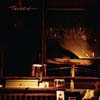 On this double CD, their third release, Jesse Poe's Tanakh have abandoned songwriting and shifted their attention to creating dark atmospheric soundscapes. Seven musicians contribute to the project, including Pat Best, who must have felt right at home here, as the shifting drones sometimes recall his work with Pelt. The music sounds very much a product of the cavernous temple in which it was recorded.Alien8 Recordings
On this double CD, their third release, Jesse Poe's Tanakh have abandoned songwriting and shifted their attention to creating dark atmospheric soundscapes. Seven musicians contribute to the project, including Pat Best, who must have felt right at home here, as the shifting drones sometimes recall his work with Pelt. The music sounds very much a product of the cavernous temple in which it was recorded.Alien8 Recordings
While listening I felt as if I had entered that space. The booklet's photographs of instruments and other constructions scattered about the dimly lit space enhance the perception of the recording. Although split onto two CDs, one 59 minute track and one 28 minute track, the music is best perceived as one piece. There is enough textural variety to make Tanakh a thoroughly enjoyable listening experience for the 90 minute duration. While it is not easy to deduce the exact instrumentation used, piano, hand percussion, guitar, distant moaning voices, and various low-end drones can be heard rising and subsiding during the piece. It seems that rather than focusing on individual instruments, the group was concerned with conveying a bigger picture that gives a sense of the space of the building itself. The resonances created by these instruments in various combinations, and at various volumes, recall both Organum and the Deep Listening projects of Pauline Oliveros. There are many levels of activity, making this a recording that will reveal different layers of sound with repeated listens. There is a haphazard, yet unified quality to the way the musicians interact with one another. A noisy, low-end rumbling sound is offset by the sound of piano strings being slowly plucked. Light percussion suggests a rhythmic element but does not set a tempo. The music feels both chaotic and calming at the same time. This sense of dynamics is what saves the album from becoming simply "ambient". It is difficult to record one piece that remains engaging for 90 minutes straight, but Poe has chosen musicians who fit the purpose well. The album benefits from having not been recorded in a studio, the immediacy of the sound being crucial to its' success. The abrupt stop at the end of CD2 implies that the tape ran out during what was possibly a much longer session. It also lends a timeless quality to the recording. There is a sense that Poe wanted the recording to be a document of what happened when a group of people gathered in a particular place at a particular time. This is a bold statement to make for someone who possesses talent as a traditional songwriter.
Read More

